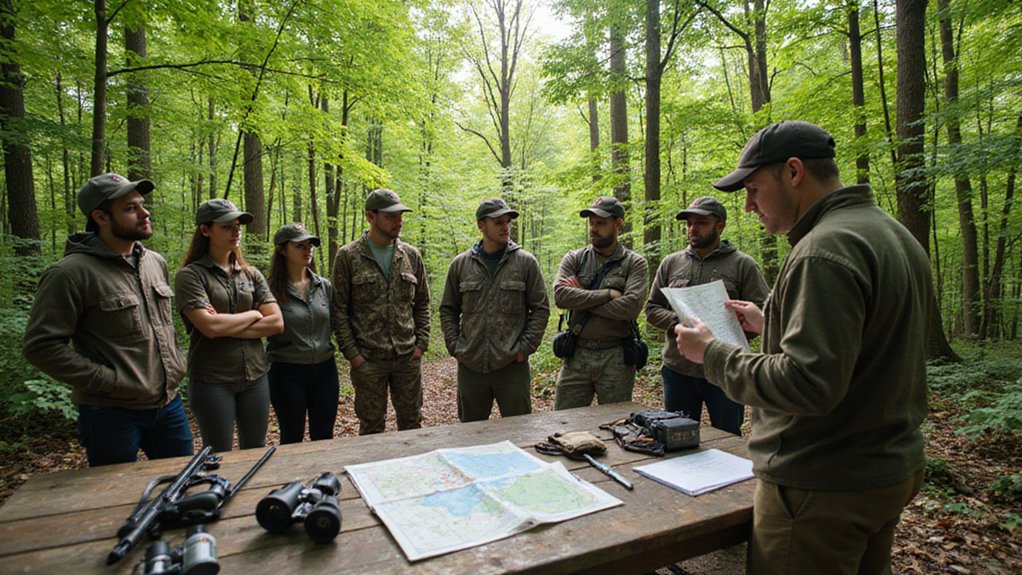Hunter Education Programs play an essential role in ensuring safe and responsible hunting. They provide vital knowledge about laws, conservation, and safety. By participating, you not only gain skills but also connect with experienced mentors. Curious about what topics these programs cover and how they can enhance your hunting experience? Let’s explore the benefits and resources available to you.
What Are Hunter Education Programs and Why Are They Important?
Hunter education programs are essential for anyone looking to engage in hunting safely and responsibly. These programs provide you with vital knowledge about wildlife conservation, hunting laws, and safety practices.
You’ll learn about the ethical aspects of hunting, including respect for nature and fellow hunters. By participating in these courses, you gain skills that enhance your confidence and competence in the field.
Additionally, many states require completion of a hunter education course before you can obtain a hunting license. Ultimately, these programs help guarantee that you’re well-prepared to enjoy hunting while minimizing risks to yourself and others.
How Do Hunter Education Programs Benefit New Hunters?
While diving into the world of hunting can be exciting, new hunters often face uncertainties that can be intimidating. Hunter education programs offer you essential knowledge and skills to build your confidence.
You’ll learn about safety, regulations, and ethical practices, ensuring you’re well-prepared in the field. These programs also foster a sense of community, connecting you with experienced mentors and fellow enthusiasts.
What Topics Are Covered in Hunter Education Programs?
In most hunter education programs, you’ll explore a variety of essential topics that equip you for safe and responsible hunting. You’ll learn about firearm safety, including proper handling, storage, and maintenance.
Understanding wildlife conservation and ethics is vital, as is recognizing different species and habitats. You’ll also cover laws and regulations governing hunting in your area.
Additionally, you’ll gain skills in tracking, field dressing, and using equipment effectively. First aid and survival techniques can be part of the curriculum, ensuring you’re prepared for unexpected situations.
How to Choose the Right Hunter Education Program for You
How can you find the right hunter education program that fits your needs? Start by considering your experience level—whether you’re a novice or seasoned hunter.
Look for programs that match your learning style, whether you prefer hands-on training or online courses. Check local regulations, as some states require specific certifications.
Research the program’s reputation; reviews can provide insight into its effectiveness. Finally, think about the schedule—choose a program that fits your availability.
What Are the Requirements for Completing Hunter Education Programs?
Selecting the right hunter education program is just the beginning; understanding the requirements for completion is equally important.
Generally, you’ll need to attend all scheduled classes and participate actively. Many programs require passing a written exam to demonstrate your knowledge of safety and regulations.
Some states mandate a hands-on skills assessment, where you’ll showcase your practical skills. Additionally, age restrictions may apply, so check your local regulations.
Completing any necessary paperwork and paying fees is also essential. Remember, fulfilling these requirements guarantees you’re well-prepared for safe and responsible hunting experiences in the field.
Why Is Hands-On Training Essential in Hunter Education Programs?
While theoretical knowledge is important, hands-on training is essential in hunter education programs because it equips you with the practical skills needed for safe and effective hunting.
Engaging in hands-on training helps you:
- Understand firearm handling and safety protocols.
- Develop shooting accuracy and confidence.
- Learn field dressing and processing techniques.
- Gain experience in tracking and identifying wildlife.
These skills are vital for ensuring not only your safety but also the well-being of others in the field.
How Do Online Hunter Education Programs Compare to In-Person Courses?
Which format suits your learning style better—online or in-person hunter education programs?
Online courses offer flexibility, allowing you to learn at your own pace and on your schedule. You can access materials anytime, making it convenient if you have a busy lifestyle.
However, in-person courses provide hands-on experiences and direct interaction with instructors and peers, enhancing your learning through real-life demonstrations.
If you thrive on personal engagement and practical training, in-person might be the way to go.
Ultimately, it depends on how you learn best and what fits your lifestyle and preferences. Choose the option that feels right for you!
What Resources Are Available for Graduates of Hunter Education Programs?
Graduates of hunter education programs often find a wealth of resources available to support their hunting journey.
These resources can enhance your skills and knowledge, making your hunting experience more enjoyable and safe.
Here are four key resources you can tap into:
- Local Hunting Clubs – Connect with fellow hunters and share experiences.
- Online Forums – Join discussions for tips, advice, and support.
- State Wildlife Agencies – Access regulations, safety updates, and conservation efforts.
- Workshops and Seminars – Participate in hands-on learning to improve your techniques.
Utilizing these resources can greatly enrich your hunting endeavors.
